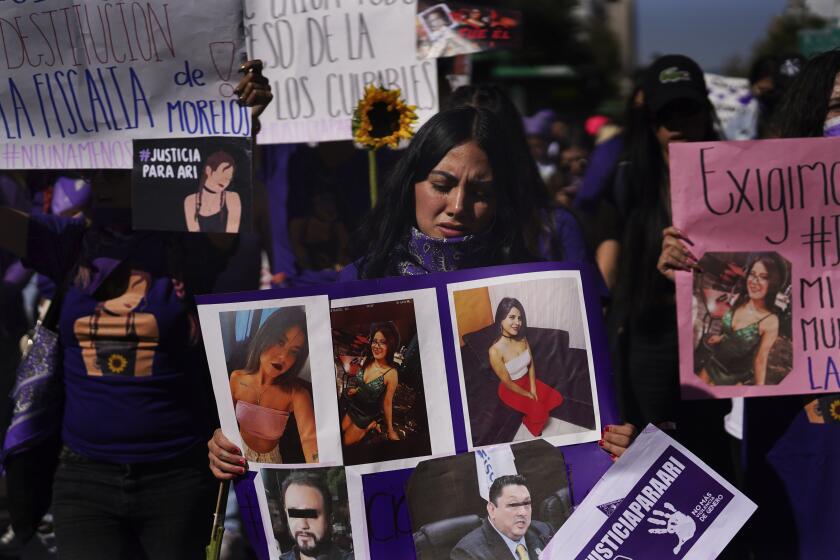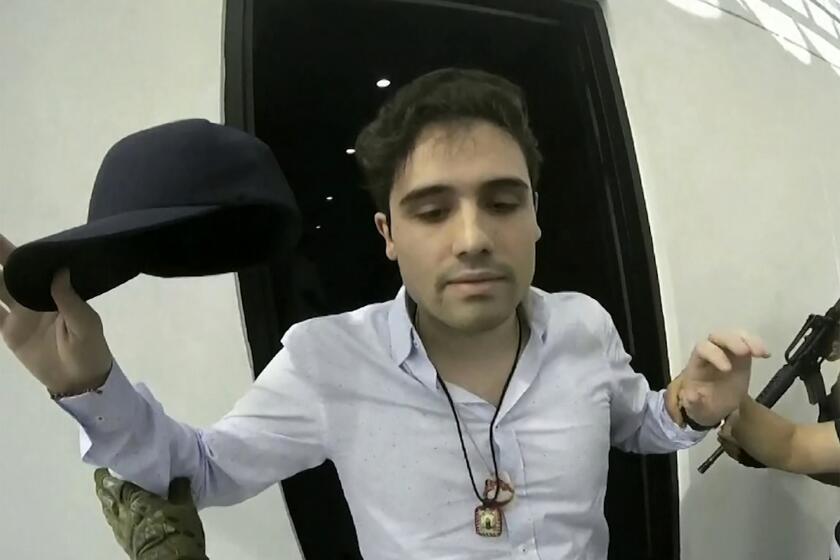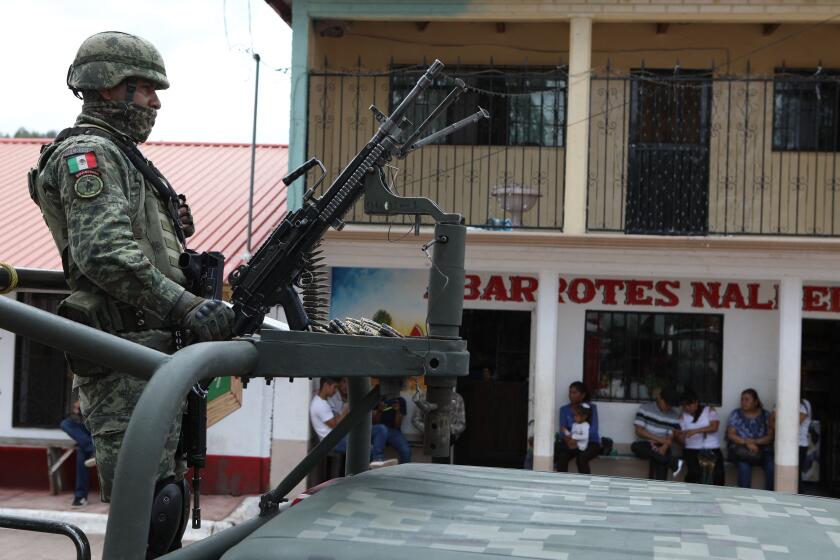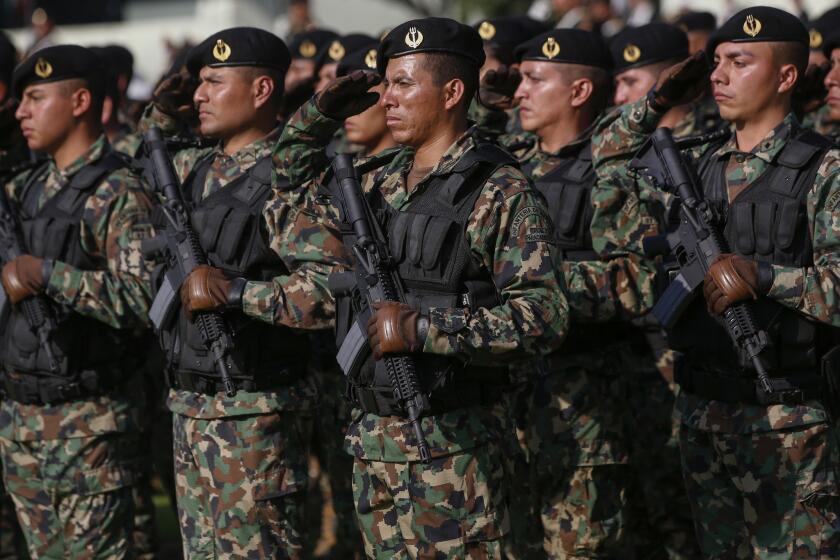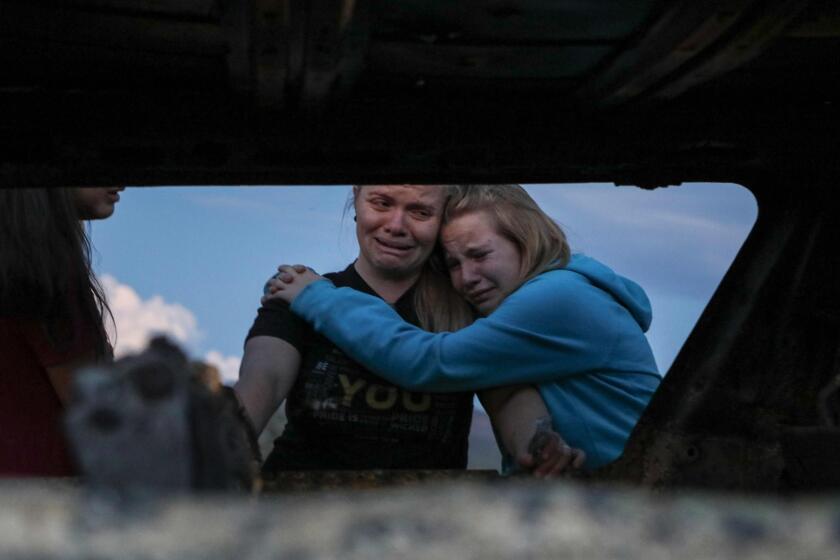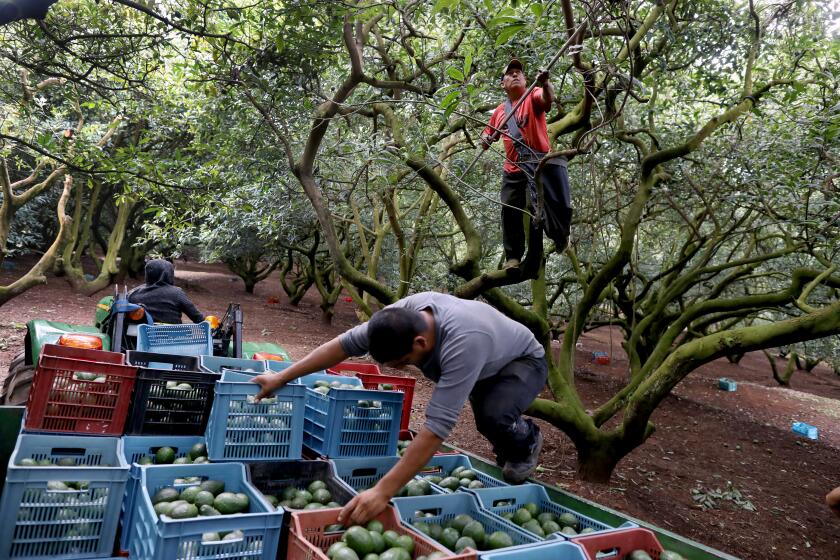2 kidnapped Americans found dead in Mexico; 2 others rescued and returned to the U.S.
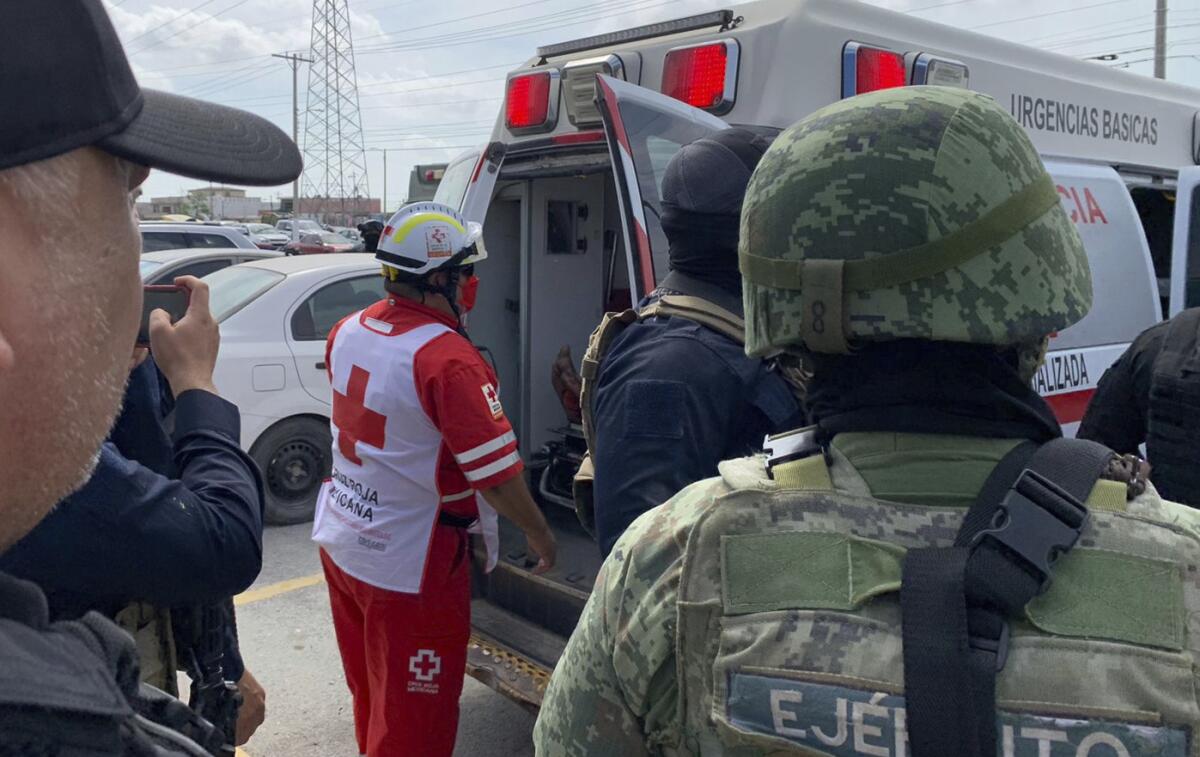
- Share via
MEXICO CITY — Two of four U.S. citizens kidnapped at gunpoint in northern Mexico last week were found dead Tuesday, Mexican authorities said, while two others were rescued after an intense manhunt that renewed U.S. focus on violence south of the border.
For the record:
8:51 p.m. March 7, 2023An earlier version of this story incorrectly said the suspect in custody, Jose Guadalupe N., is 23. He is 24.
The Americans were located Tuesday morning in a small wooden house in a field outside the violent border city of Matamoros, said Irving Barrios Mojica, the attorney general of Tamaulipas state. Mexican authorities detained one suspect, identified only as Jose Guadalupe N., 24, who they said was guarding the house.
The two survivors — Latavia “Tay” McGee and Eric James Williams, who was badly wounded in his left leg — were rushed to the border in a convoy of ambulances and law enforcement vehicles and handed over to U.S. authorities in Brownsville, Texas.
The frantic rescue came four days after unknown gunmen fired on the tourists amid a busy stretch of downtown Matamoros, then loaded them into the back of a pickup truck and sped away.
The disappearance of the four friends sparked an international incident, with the FBI launching an investigation, the White House intervening and some Republican members of Congress calling for invading Mexico with U.S. troops.
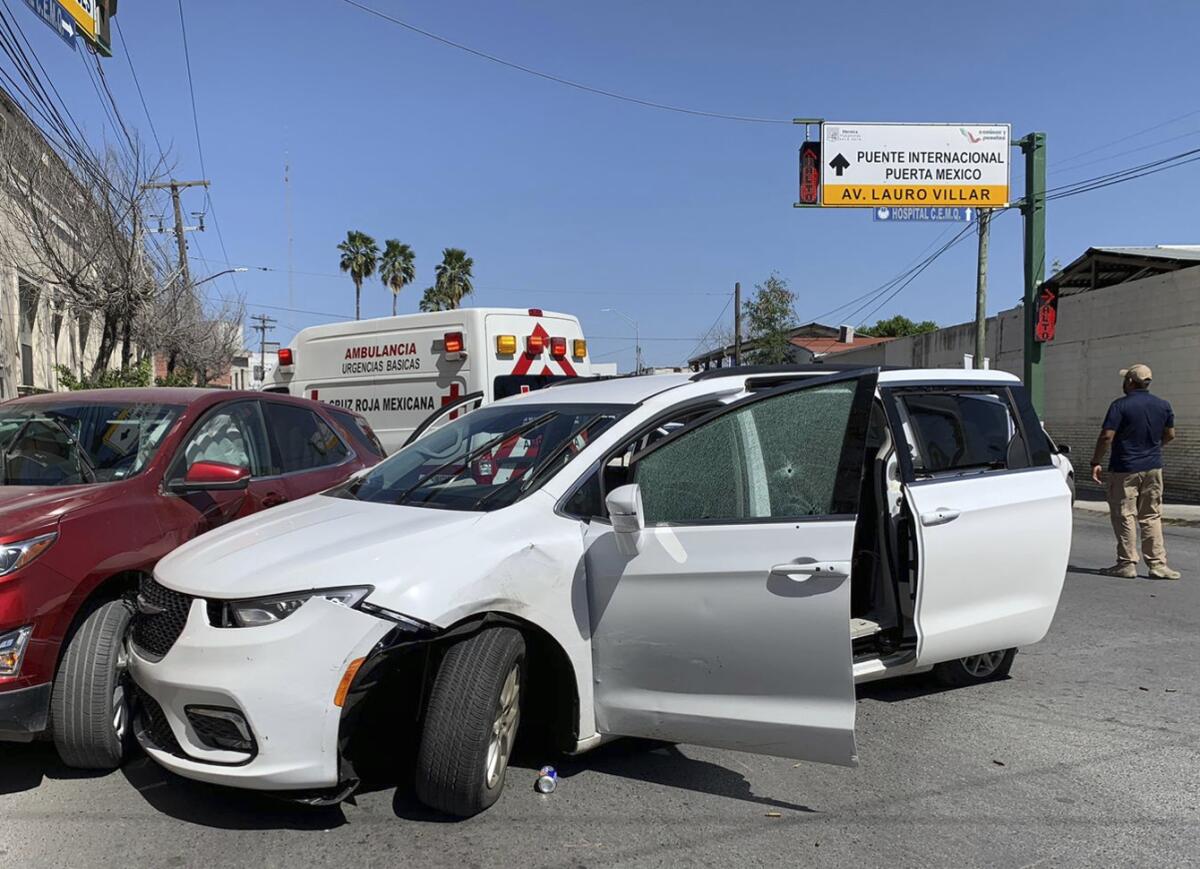
“This tragic incident only highlights a rising preoccupation in the United States about Mexico’s lack of interest in facing down organized crime,” said Tony Payan, director of the Center for the U.S. and Mexico at Rice University’s Baker Institute. The kidnapping in Matamoros, he said, “has become a symbol of impunity in Mexico.”
The U.S. government condemned the kidnapping and deaths, with National Security Council spokesman John Kirby saying Tuesday that “attacks on U.S. citizens are unacceptable, no matter where ... they occur.”
The gruesome killing of Ariadna López shocked Mexico, spurred protests in the capital and highlighted the nation’s epidemic of violence against women.
And though Kirby said the FBI had worked closely with Mexican officials and would continue to collaborate with them, there was little doubt that the incident threatened to further inflame binational tensions over Mexico’s security strategy.
In Mexico stronghold of Sinaloa cartel, armed men burn vehicles, storm airport to try to prevent capture of drug lord Joaquín ‘El Chapo’ Guzmán’s son.
With homicides in Mexico hovering around all-time highs and a record number of American deaths linked to Mexican-produced fentanyl, many in the U.S. have grown increasingly critical of Mexican President Andrés Manuel López Obrador’s “hugs not bullets” crime-fighting policy, which purports to emphasize social programs over violent confrontations with criminal groups.
And while in practice López Obrador’s strategy largely resembles that of his predecessors, with high-profile arrests of cartel leaders, regular seizures of drug shipments and even more federal troops in the streets, his softer rhetoric, combined with violent incidents such as the one in Matamoros, “reinforces the narrative being pushed on the right side of the U.S. political spectrum that Mexico is a lawless country,” said security analyst Alejandro Hope.
President Andrés Manuel López Obrador promised a radical break with the militarized security strategy of his predecessors, which he blamed for turning Mexico ‘into a cemetery.’ Instead, he has embraced the armed forces with unprecedented fervor.
The Americans who were killed have not been officially identified but were named by various news outlets as Shaeed Woodard and Zindell Brown.
Family members of the victims told news outlets that the four arrived in Matamoros on Friday so that McGee could undergo a tummy tuck — a surgical procedure to remove abdominal fat.
Each year, nearly 1 million U.S. citizens seek medical procedures in Mexico, where drugs and treatments are generally much cheaper than in the United States, according to the Mexican Council for the Medical Tourism Industry.
According to the FBI, the four were in a white van with North Carolina license plates when “unidentified gunmen” fired on their vehicle. The Americans were then thrown into the back of a truck and spirited away, a violent scene captured on a widely disseminated video. Mexican authorities said a Mexican woman was killed in the shootout.
Violence in broad daylight is common in Tamaulipas state, which has long been one of the most lawless regions of Mexico and which is currently the site of a turf war between dueling factions of the Gulf cartel. The state ranks high in homicides, kidnappings and “disappearances”; in the vast majority of cases, the victims are Mexicans.
That the victims this time were Americans immediately made the kidnapping international news.
The U.S. decision to drop drug trafficking charges against Gen. Salvador Cienfuegos shines a light on Mexico’s increasingly powerful military.
On Tuesday, some Mexicans reacted to news of the rescue operation with a mixture of relief and exasperation. Seldom if ever do the frequent kidnappings of Mexican nationals attract such attention. And the vast majority go unsolved in a country where the number of “disappeared” has soared to more than 110,000.
“What has to happen so that the cases of kidnapping and disappearance in Mexico are investigated at the same speed with which they dealt with the case of the four Americans taken in Matamoros?” Pascal Beltrán del Rio, editorial director of Excelsior newspaper, wrote on Twitter.
“The government only prosecutes criminals under foreign pressure,” tweeted Lilly Tellez, a senator with the center-right National Action Party. “We Mexicans are utterly defenseless.”
The attack came at a time when U.S. officials along the border and in Washington have become increasingly attuned to violence in Mexico.
Citing high levels of overdose deaths, several prominent Republicans, including former U.S. Atty. Gen. William Barr, have called in recent months for Mexican cartels to be designated as “terrorist organizations.” And this week, Sen. Lindsey Graham (R-S.C.) said he plans to push legislation that will “set the stage” for the use of U.S. military force in Mexico.
The deadly attack Monday on U.S.-Mexican citizens in northern Mexico has brought renewed attention to the history of fundamentalist Mormon communities that settled in northern Mexico in the 19th century.
He seemed to be taking a cue from former President Trump, who, after the 2019 killings of nine American women and children from a small Mormon community in northern Sonora state, also threatened to send soldiers into Mexico.
López Obrador said Tuesday that his government would not allow “foreign countries” to intervene in his nation’s domestic affairs, adding that Mexico doesn’t “meddle” in American law enforcement issues. His administration has sought to highlight how Americans’ appetite for illicit drugs and the illegal flow of firearms from the U.S. have played a significant role in Mexico’s violence.
He criticized what he described as “tabloid” coverage of the Matamoros incident and said media outlets are “silent like mummies” when Mexicans are killed in the United States.
It’s not just drugs. Mexico’s cartels are fighting over avocados.
But he also said he hoped it would not sour U.S.-Mexico relations.
“We are working daily to guarantee peace, security,” the president said. “We are very sorry that this happened in our country and we send our condolences to the families of the victims.”
U.S. and Mexican officials said they are still investigating a central question: Why were the U.S. visitors in Matamoros attacked in a city where many tourists cross over daily from Brownsville with no problems?
Barrios said the tourists may have been the victims of “confusion,” or mistaken identity. One theory is that the assailants may have opened fire after mistaking the van for a vehicle transporting rival gangsters.
Business leaders in Tamaulipas said they worried the incident would deflate commerce, especially in the medical tourism sector.
“Unfortunately,” said Julio César Almanza Armas, who heads Tamaulipas’ Federation of Chambers of Commerce, “what happened here is going to be a mark against us for many years.”
Special correspondents Cecilia Sánchez Vidal in Mexico City and Juan José Ramírez in Matamoros contributed to this report.
More to Read
Sign up for Essential California
The most important California stories and recommendations in your inbox every morning.
You may occasionally receive promotional content from the Los Angeles Times.
